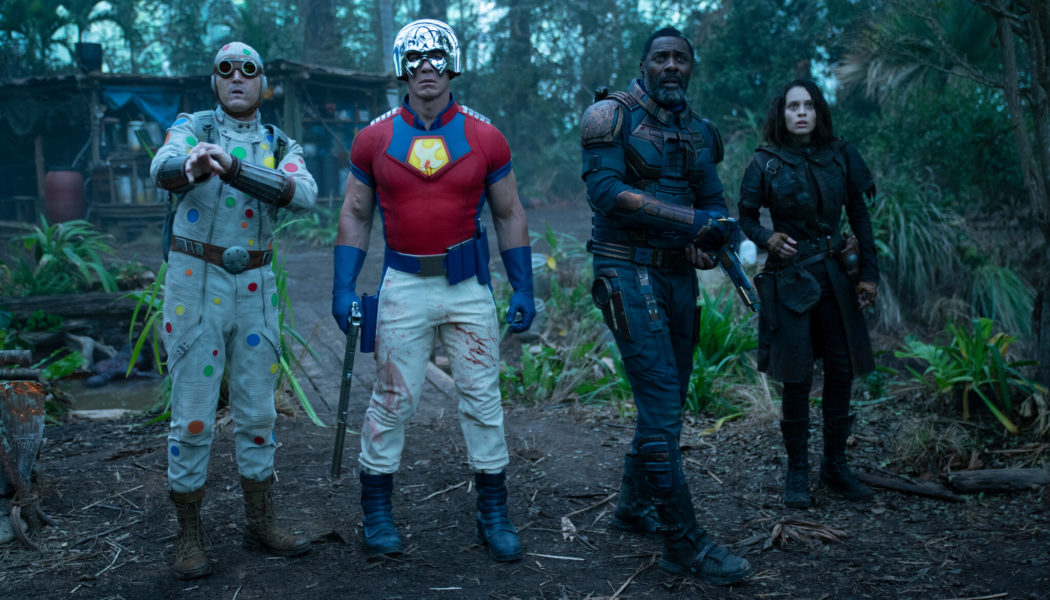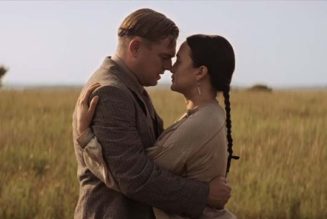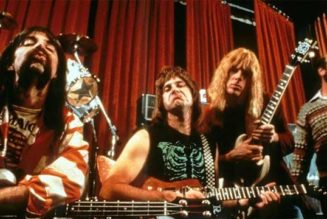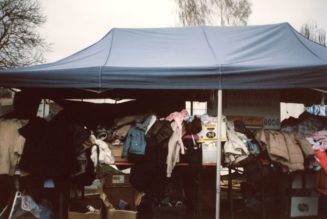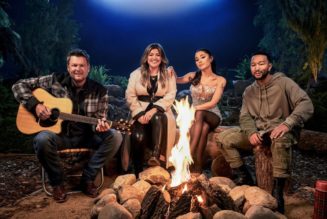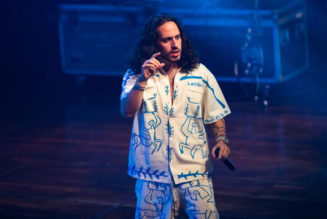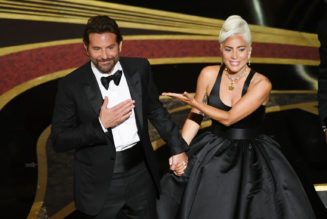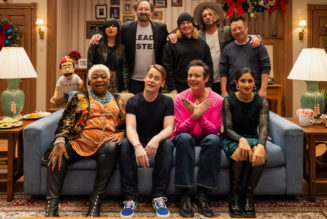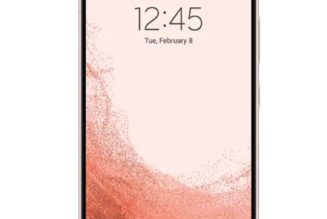Look, Suicide Squad was bad.
We’re not pointing fingers at anyone in particular for why the 2016 movie didn’t work, but it just didn’t. The movie couldn’t even be saved by classic dialog like “This is Katana. She’s got my back. I would advise not getting killed by her. Her sword traps the souls of its victims.”
Conversely, The Suicide Squad, is quite a good time.
We won’t spoil any of it for those who haven’t seen it yet, but James Gunn is clearly made for offbeat superhero movies, and punk rocker-turned-composer John Murphy (28 Days Later, Kick-Ass, Snatch) reminded everyone that he’s still one of the best in the industry.
The movie is out today both on HBO Max and in theaters, and ahead of it, SPIN spoke with Murphy on Zoom about both the new release and some of his previous greatest hits.
SPIN: With The Suicide Squad now out, what should people expect from it?
John Murphy: It’s bonkers. It’s a fucking roller coaster. It’s hyper-violent and hyper-funny, but it’s also got a real emotional, beating heart throughout it too. It’s the most comic book movie I’ve ever seen, because it has that excitement you get when you turn the page and crazy shit that you never expected is happening on the next page. It’s got that sensibility, you know, it’s got that it’s like a comic book on steroids. It’s got that joyous “Let’s fucking go for it!” sort of shock value. If you like that stuff, you’re gonna love it. It’s not your typical comic book movie. It’s very vivid, it’s very graphic, and it’s just loads of fun.
What was it like to work on The Suicide Squad with James Gunn and everyone else?
It was amazing. I know there’s been a lot of James Gunn love going around, but I have to say, he makes it very, very easy to want to work your ass off. He’s a very cool, funny guy, but what really makes the difference is just this passion that he has. He really is a fan of what he’s doing. He loves these characters, but he was also so passionate about the music — and that’s what made it easy for me. He writes the songs into the script, and he writes his scripts with music playing because that’s what inspires him.
I think he was in a punk band, and I started as a guitarist in a punk band. I didn’t go to music school or do the whole Juilliard thing. I come from very strange roots, so my vocabulary with music is very much from someone who was in a band and then taught myself to orchestrate. We had great conversations about loving old punk records and how metal started. He really put a composer like me at ease.
Probably the best thing he did was to let me have a shot at basically every scene. Every time we’d get to a scene, we’d talk about the story, the underlying themes of the film, and how this character needs to develop. It wasn’t like “Oh, this has to be drums” or “This is where the orchestra comes in.” He basically just said, “This is what I need from this scene emotionally, so surprise me, give me your best shot, and we’ll work from there.” But he just let me try things out, because he’s basically a rebel, so he will always push things into being a bit different or unconventional. I’d say 90% of the time, the minute I did anything remotely conventional, he would pull me up and go “Come on, that doesn’t sound like you!” It’s fucking awesome when you’re trying to write in your own style but you’re also trying to please a director, because he made me feel like if I just did my own thing as good as it could be, then we’ve got something to work with.
Seeing as this is the first film you’ve scored in over a decade, how did it feel to come back after that time away and directly back into a project of this magnitude? I mean, The Suicide Squad isn’t exactly a warmup.
It was fucking terrifying! It’s funny, because I took time off to spend time with my family, and I was feeling a bit burnt out. I’d just done Kick-Ass, and I just felt like I needed a break. My kids were young, and I wanted to set my record label up, so I knew it was gonna be an extended break. When I decided to come back, I thought that instead of diving straight into a movie, maybe I’d do a TV thing. Then [Les Misérables] came up, and I’d never seen the musical — I don’t like musicals — but I love the book. When I used to tour, I would take all these big, heavy books with me. I remember reading loads of Victor Hugo, and I loved [Les Misérables]. So I thought that’d be cool, and it was like eight episodes on the BBC, so it’d be a huge amount of music and a nice way to blow the cobwebs away.
The plan was to do [Les Misérables] and then go back to my roots with a few cool, low-budget indie films to just breeze my way back in. [Les Misérables] went great, but then as soon as I started thinking about what I wanted to do next, I got a call to say James Gunn was trying to get hold of you, and that was it. You don’t really say no to James Gunn — and not just because he’s a big director but because he’s fucking James Gunn. I love the Guardians [of the Galaxy] stuff and even the stuff before that. There’s a vibe to him that I connect with. By the time I put the phone down, I wanted to start working on it. I went to Atlanta a few days later, and he took me around the sets. I ended up staying there for a few days, and I could see why actors love him. He’s a lot of fun and he makes you want to do your best work for him.
The funny thing was, when I kind of went into my hiatus, my kids were young and I really felt like I needed to be with them. Then it got to the point where they got a bit older and would say “Dad, why don’t you do movies again? You were cool when you did movies.”
Looking back at the films you’ve scored, you’ve pretty much hit every genre and style of film. Did you intentionally not want to be pigeonholed into one thing, or was it more just about taking what was available?
Let’s be honest, I wasn’t that good at some of them. A romantic comedy? What were they thinking?
But as an example of that variety, you had maybe one of the most diverse months in history in November 2002, when both 28 Days Later and Friday After Next released…
Well, Friday After Next was because I knew [Ice] Cube, because we’d actually written some stuff together and had a relationship. He’s a cool guy, and the Friday films are really funny cult classics, so there was no way I was not going to do that one. At that point, I was still trying to find my way. I’d done the two Guy Ritchie movies [Lock, Stock and Two Smoking Barrels and Snatch], but I wasn’t a known composer in any way. So when you’re not really established yet, and something comes along where they really want you to work on it — and you know they’re good people — well it might not be what you would go and watch yourself in a movie theater, but you’re not going to turn that work down.
I did end up doing a lot of films that were films where I was really just doing the job as best I could. Whereas I did five films with Danny Boyle, and that was a very different experience. That was more of a creative thing. We felt like we were doing something new, and it felt exciting and worthwhile.
Speaking of your work with Danny Boyle, 28 Days Later is generally considered one of the best horror movie scores of all time. I know it’s been like 20 years, but what went into making it so different than a typical “zombie” soundtrack?
That film was a game-changer for me — not because it became so big and so influential, but because it was actually the first score where I did what I wanted from beginning to end. The reason why I think Danny was very non-precious about it is that when he called me up, he said “John, I’m doing this zombie home movie film. Nobody wants to distribute it, no one wants to even produce it, and probably no one will ever see it. So what do you think?” He basically said, “No one cares, so we can do what we want.” I said “Let’s just try and do something as different as we can” because I had this stupid ass idea of how we could make it feel very different with the music. In all of the places where you would have screeches and screaming loud music in a zombie film, we’ll leave them naked, so it feels real. In all of the places where you never have music in a zombie film — the talking bits and such — that’s where we put our music in, because it might ground it more and make it feel more human.
Then there’s the big scene at the end, where you’ve got the whole end climax with the soldiers and shit’s going off — and the gore and blood and screaming and the infected are everywhere. Most directors would want to go with something big and loud for that, but we didn’t want to sell out at the end. So I took the vocals off this song I’d written and just played it through, and it was really weird. It started with a tiny little piano, and then it went to like this little groovy acoustic guitar, and then it just got bigger and bigger. It was really just a big crescendo, and it didn’t hit any of the inputs, until that last moment where I think Selena says “In a heartbeat.”
I thought “This is fucking awesome, but there’s no way Danny’s gonna go with this.” I sent it to him, and he rang me on the phone. He went “Fucking great! Don’t change a thing.” Every director’s got that last act on their mind, and especially the last 20 minutes of a movie, right? So for him to make that decision to let me do a track like that, it was a big deal to me. Now people call it “the 28 Days theme” or whatever. But that taught me a big lesson, that basically it’s not worth being a pussy, and you should bring your own DNA to wherever you think you can in a film.
